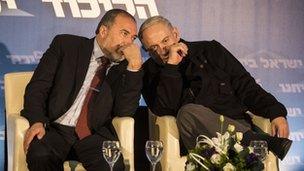Why Russian Israelis vote right
- Published

One ticket: Yisrael Beitenu and Likud are expected to get a majority of the Russian Israeli vote
Israel's million-strong Russian-speaking community has become one of the most influential political forces in the country - and their vote could be decisive in next week's Knesset elections.
The community is important not just because it makes up 20% of the country's population.
In recent years, it has backed the election winners, who have been right-wing or right-of-centre candidates.
The party that has recently drawn the larger part of the Russian vote has been Yisrael Beitenu (Israel Our Home). It is expected to do so again on 22 January.
Led by Avigdor Lieberman, the party is running on a joint ticket with Israeli Prime Minister Benjamin Netanyahu's Likud.
Mr Lieberman resigned as foreign minister in December to face charges of breach of trust.
Security is personal
"The army has to provide security," says mathematics teacher Boris Manor, one of Yisrael Beitenu's Russian-speaking supporters.
The problems of security are very personal for Mr Manor. Home is in Ashkelon in southern Israel, a city that was hit by missiles in the last war with Hamas, and just an hour before he spoke to the BBC, he saw off his 18-year-old daughter as she left for military service.
"If a rocket lands, the government must react swiftly, and not just meet on a weekly basis to discuss the next steps," he continues. "We cannot tolerate this shelling - no other state in the world would allow it. We need to be stricter."
Yisrael Beitenu's programme puts things in an even more straightforward way. The party is strongly opposed to any concessions to the Palestinians, and it defines the conflict in the Middle East not just as war for the land, but as a standoff between nations that are hostile to each other in religious terms, views on the world, language and people's aspirations.
It wants to annex Jewish settlements in the occupied territories and exchange them for land in Israel where Arab Israelis live. And it stresses that Jerusalem, a city with a current Muslim population of about 280,000, "will always be the undivided capital of Israel".
Such slogans, of course, are supported not just by the Russian-speaking Israelis. Most of the country's population is disillusioned with any peace process - and the current government coalition is widely expected to remain in power.
According to a poll by the Israel Democracy Institute, some 28% people think that Mr Lieberman is capable of handling the security situation well. On that issue he comes second only to Prime Minister Netanyahu, who is trusted on security by 53% of Israelis, according to the same poll.
'Winning combination'
Israeli journalist Lily Galili, who has just published a book about Russian-speaking Israelis called The One Million That Changed The Middle East, explains that the newcomers from the former USSR have a "winning combination" of being right-wing and not religious.
And in Israel, where faith and secularism are very often in conflict, that ideology turns out to be very attractive.
Ms Galili thinks that such views might come out of the Soviet way of thinking.
"They come from this huge empire to this tiny Israel and they say: "Is that all, is that the country? And what, you want to give back the territories? Who gives up territory in the first place! And in this small country. You must be kidding!""
Many Russian-speaking Israelis explain that the hardships they had to endured in the USSR and during the Soviet collapse have made them suspicious of left-wing politics and more conservative.
According to Russian-speaking Israeli analyst Igor Khlopitsky, the desire for quick and effective measures comes from political and economic chaos of the early 1990s.
"Those who came after Perestroika had the Soviet mentality beaten out of them by the very difficult problems of the time. And where some other Israelis see the possibilities for discussion and dialogue, they just want to solve the problems swiftly."
And the tragic and traumatic events of the World War II make the community's older generation keen to avoid war at any cost, adds Mr Khlopitsky.
"First and foremost what we want in Israel is peace and clear sky", agrees Grigory Manoilenko, grandfather of Coral, a newly drafted Israeli conscript.
So far, most Russian-speaking Israelis have voted for right-wingers who are opposed to any compromises with the Palestinians and may suggest easy solutions for difficult problems. More widely, with the peace process at a standstill and Iran seen as an ever present threat, the right in Israel is resurgent.
But the children of Soviet immigrants, who often speak Russian with a distinct Israeli accent, are not very different from their counterparts from other Israeli communities and are expected to vote along different lines and be concerned with different issues, such as the economy.
This election might demonstrate just how distinctive the new generation's voice has become.